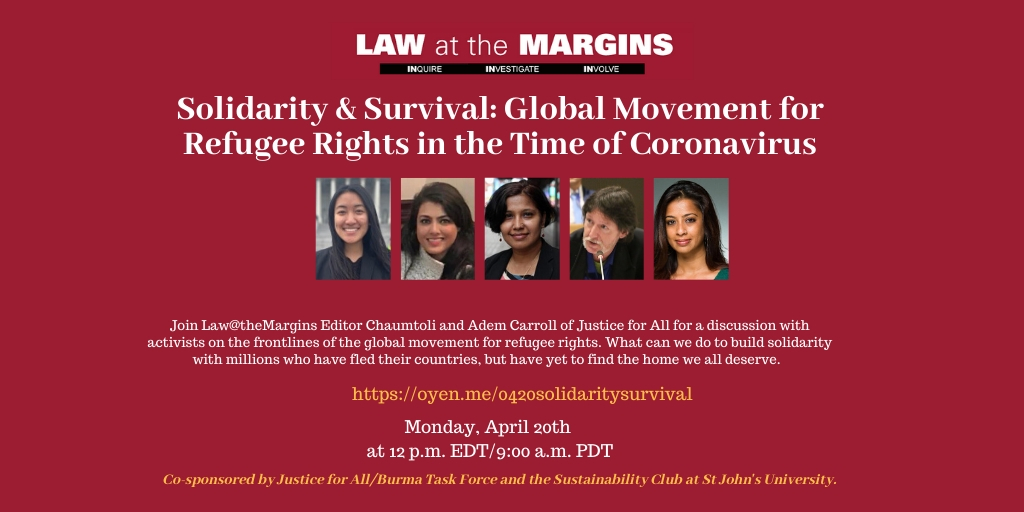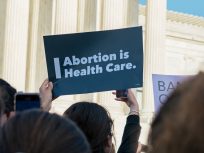
On April 20, 2020, Law at the Margins hosted the Solidarity and Survival webinar, led by Justice for All/Burma Task Force and the Sustainability Club at St. John’s University. Moderated by Adem Carroll of Justice for All, the webinar explored the trend of persecution and marginalization, and the impact that continued oppression has in this moment of crisis, specifically in South Asian contexts. The homeless, refugees and displaced persons are being “excluded from healthcare, pandemic relief, and income support,” Carroll said. This is the case for those both documented and undocumented.
Monami Maulik, Civil Society Liaison Officer at UN Network on Migration, founder and original executive director of Desis Rising Up & Moving (DRUM), spoke about the impact of COVID on displaced populations, and the global structure of borders and migration. “The crisis,” Maulik says, “is being utilized as a way to restrict borders, which has extreme implications both presently and for the whole conception of human mobility and migration in the long term.” In response to these measures, the UN Network on Migration has begun hosting listening sessions to hear across regions and countries about the impacts of COVID at the ground level.
Three main themes are apparent: economic and social rights, global closure of borders, and the political landscapes around political and civil rights. The reality that migrants are most at risk, are most of our essential workers, and are being excluded from social assistance is something that is consistently being ignored by those making policy decisions related to COVID19. For those working on the ground, many are dealing with quick loss of staff and resources as mass deportations of temporary migrant workers continue to accelerate. In conjunction with decreased organizational capacity, detention rates and risk of indefinite detention is greatly increased as countries close their borders. Finally, COVID19 is being used to push nationalistic and xenophobic lanugage and policies. Activists are particularly concerned about data and privacy rights, as well as safety of activists mobilizing for migrant rights.
JanJan Maran, Kachin American human rights activist, President of the GMU STAND chapter, Burma Policy Lead of Action Corps and Assistant Secretary of the Kachin Alliance, discussed the impact that students can have in local activism. “The power of students – I believe that students have the power to enact change. We may be learning from books, but we still know how to organize….We are engaged and energized and have a lot to offer.” Burmese communities are different from one another and vary in terms of community development: “We are really well established in DC, but in areas of Indiana and New York, for example, many communities are still relatively new, which creates information and technology gaps.” For these communities, and many like them across the globe, social distancing is a luxury. “We must remember the conditions that many people are living in — and those conditions should not be normalized.”
Sana Qutubuddin, activist with Indian American Muslim Council, spoke about the impact of COVID19 on India’s vulnerable populations. “The pain and suffering that has resulted as a result of this shut down has not been acknowledged. Much of the media reporting on the humanitarian crisis has not been acknowledged.” Many of the migrant workers in India are from the lowest caste, many are India’s Muslims. “For Muslims,” Qutubuddin says, “90% of our ancestry comes from the lowest class,” which compounds vulnerability. The spread of misinformation is contributing to increased concern about the safety of many populations, and has led to many deaths.
Together, the speakers showcased the impact of failures in multiple systems: legal, humanitarian and crisis response, as well as the compounding oppressions of legal status, climate justice, and access to social services. “IDPs are often not included in discussions about migrants and refugees; they are often excluded from global documents and protocols dealing with cross-border migration,” Maulik says. New discussions on migration, border protection and new surveillance technologies will shift the paradigm of migration and public health. “And this will impact marginalized communities the most.” Qutubuddin showcased how this is being played out in India, with many individuals, mostly Muslims, not receiving treatment for basic issues. “Healthcare and medical care is a huge issue,” she says, “but many are failing to speak on this new COVID-branded Islamophobia. And this is occurring globally. This issue is a blackhole for reporting.” “Unless awareness is raised,” Maran says, “things will continue as before. This will affect everyone, and we must think about how this will impact the poor, IDPs, and other marginalized communities.”
Resources:
PBS News Hour: Before Ebola, Ellis Island’s Terrifying Medical Inspections: https://www.pbs.org/newshour/health/october-15-1965-remembering-ellis-island
Civil Society Action Committee: First, Save Lives: Solutions for the COVID-19 Pandemic and New Solidarity with Migrants and Refugees. https://csactioncommittee.org/wp-content/uploads/2020/04/Civil-Society-Statement-on-COVID-19-and-Migrants-final.pdf
Indian American Muslim Council: https://www.iamc.com/
IDPs are Like Me Campaign: https://docs.google.com/document/d/1QAERgRq4X_miuJf3DvH5EjpDa2k6Ow7Gqi0-kRPOsRo/edit?usp=sharing
powered by Crowdcast



